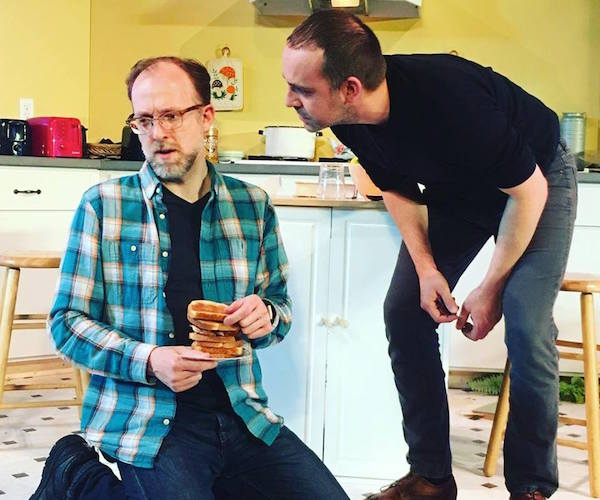Theater Review: “True West” — American Anarchy
Hub Theatre Company’s True West is a joy to watch.
True West by Sam Shepard. Directed by Daniel Bourque. Staged by the Hub Theatre Company of Boston at First Church Boston, 66 Marlborough Street, Boston, MA, through April 26.

Bob Mussett and Victor Shopov in the Hub Theatre Company production of “True West.” Photo: Hub Theatre Company.
By Erik Nikander
The late Sam Shepard’s True West is a wild, raucous comedy that never feels the strain of its exaggeration of sibling rivalry. Comic amplification runs rampant during the play’s 90 minute runtime, but the rowdiness is always grounded in convincing pain and emotion. Shepard’s finely honed script revolves around an epic clash between a pair of brothers who could hardly be more different, but the script’s sparks won’t fly without the performers’ supply the proper amount of electricity. Fortunately, the Hub Theatre Company production of True West proffers two stunning leads, and their exceptional performances are backed up by thoughtful direction and a dedicated artistic team.
Austin (Bob Mussett), a timid, Ivy-educated screenwriter, has agreed to watch his mother’s house in southwest California while she’s away on a trip. His swaggering brother Lee, who makes his money burglarizing TVs, pops in and out, swigging Coors Light and pestering his brother for his car keys. Neither one holds the other in much regard. When Hollywood producer Saul (Robert Orzalli) stops by to talk with Austin, Lee crashes their meeting and pitches a movie idea of his own. Saul loves it; Austin, to his dismay, is recruited to work on his brother’s script. The brotherly brawl that ensues looks sure to tear their relationship (and their mother’s kitchen) apart.
From the play’s first moments, Shopov dominates the stage as Lee, stalking around the kitchen like a ravenous wolf, bursting with animal cunning. He alternates between moments of languid ease and intense, frightening physicality. He imbues the character with an air of unpredictability that makes his Lee often truly frightening. At the same time, for all of Lee’s seediness and boorishness, Shopov manages to make him surprisingly likable. Rough as the character is, he’s not unfeeling, and when he’s pushed out of his comfort zone and into the literary world his frustrations pile up in a palpable way; Shopov makes that agony and discomfort feel real.
At first, Austin is utterly overpowered by Lee’s larger-than-life presence, and I was concerned that Mussett’s mild, underwhelming performance reflected a weak actor instead of a dramaturgical strategy. Luckily, I was wrong. Mussett is terrific at evoking Austin’s meek side, but he also sinks his teeth into the man’s breakdown with gusto. The calm and collected screenwriter devolves into a passionate, booze-addled wreck, his voice rising in ecstatic bursts. The transformation is both sad and hilarious, and Mussett dives deep into the role’s highs and lows.
Director Daniel Bourque sees to it that these powerhouses mesh together to form a taut and compelling dramatic whole. Shepard’s script finds meaningful character beats in small, everyday conflicts, such as the struggle over a set of car keys, and Bourque accomplishes the same through the attention he pays to nuances of movement. Take, for instance, the different ways in which the characters type. Austin, the professional writer, uses his typewriter like a trained pianist plays a baby grand, fingers dancing over the keys in a practiced, steady rhythm. Lee, on the other hand, uses the hunt-and-peck method, stabbing awkwardly at individual letters; his physicality renders him clumsy in the world of intellect. Bourque’s dynamic blocking also provides excitement while imbuing the explosive fracas with emotional texture.
Speaking of typewriters, the show features a boatload of props, designed with skill by Cesara Walters and Valerie Tracy. There are more objects in the play that Austin and Lee type on, steal, drink from, smash, and make toast with than can be listed in a review; suffice it to say that, like the small, subtle acting choices that deepen the experience of the play, the props work is careful and thoughtful down to the most minute detail. The set, designed by Ben Lieberson, is the very archetype of a homey American kitchen, featuring warm yellow walls, clean white cabinets, and a generic Kincaid-esque painting providing eye candy. As the strained family dynamic starts to break apart, the props are strewn about the set, providing a concrete expression of the emotional chaos.
Are there any aspects of this show that fall short? Well, the performances by Robert Orzalli as Saul and Maureen Adduci as Mom aren’t especially memorable; that said, neither character has much time on-stage, so these actors have little opportunity to stretch their dramatic legs, at least compared to the two brothers. Also, Hub Theatre Company’s decision to set the play in the present — rather than the original’s 1980’s time frame — creates a few moments that feel a little incongruous. Still, these quibbles hardly dampen the dramatic power of the evening. Nearly every aspect of Shepard’s world has been handled with impressive craftsmanship, from the acting and directing to the props work and the incorporation of music by Jay Mobley and Simon Hanes. Hub Theatre Company’s True West is a joy to watch, an engrossing and honest journey through the bedlam that lurks beneath the surface of the average American family.
Erik Nikander is a critic, playwright, and filmmaker based in the New England area. His film criticism can be read on Medium and his video reviews on a variety of topics can be viewed on Youtube at EWN Reviews.
